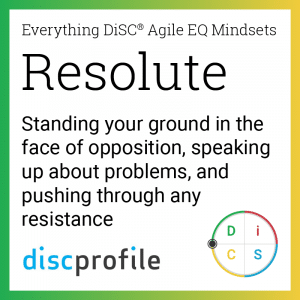Do you have the resolute mindset in Everything DiSC® Agile EQ™? Resolute is one of the eight Agile EQ mindsets, and tends to come more naturally to people with CD and DC styles. It’s important to remember that all eight mindsets are available to everyone to call upon when the situation demands it, even if some take more effort for you.
This article will help you understand the resolute mindset, including its uses and overuses. If the resolute mindset is not one that comes naturally to you, and you’d like to get more comfortable with it, see How to be more resolute.
“I stand by my beliefs.”
People with resolute mindsets project confidence and speak up about problems. They don’t give in when pushed toward something that doesn’t sit right. It’s (usually) not about getting their way for the sake of getting their way—it’s about believing in themselves and not caving just because someone else is louder.
Resolute people believe it’s their responsibility to communicate their ideas clearly so people know where they’re coming from. They know a bit of tension and disagreement is OK, or even good. Their comfort is less important than doing justice to their ideas. People with resolute dispositions tend to have high standards and push back against flawed reasoning. They are willing to tackle obstacles that might hold others back, moving forward to accomplish their goals. They have the ability to view a setback as an opportunity, while others might deflate.
Benefits of the resolute mindset
 All teams need someone who will get things done and get them done right. Whether or not the resolute mindset is one that comes naturally to you, calling upon this mindset helps you
All teams need someone who will get things done and get them done right. Whether or not the resolute mindset is one that comes naturally to you, calling upon this mindset helps you
- stand up for your beliefs
- advocate for your needs
- persist through challenges that might otherwise threaten your goals
- maintain confidence in your perspective, even when others cast doubt
- speak up when there’s a problem, even if it causes discomfort
- project a confidence that gives courage to others
- refuse to settle when you know something can be better
- keep a project moving forward, even when there is ambiguity
Which needs drive the resolute mindset?
The mindsets that we reach for most often are the ones that support our deepest social and emotional needs. The actions and dispositions of resolute people are often driven by needs such as
- competence
- independence
- influence
- control
- meeting high standards
- making progress
People with different DiSC® styles find the resolute mindset comfortable for different reasons.
Limitations of the resolute mindset
We all rely too much on the mindsets that are most comfortable to us, rather than choosing the best attitude for each situation. If you get stuck in the resolute mindset, you might
- become overly stubborn or competitive
- dig your heels in to retain power
- refuse to back down out of a desire to be right or to “win”
- become so inflexible that you alienate colleagues or cause them to shut down
- fail to consider facts or opinions that contradict your own
- project dissatisfaction
- miss out on a better opportunity or approach because you’re so intent on holding your ground
- focus so much on your goal that you close yourself off to warning signs when something is wrong
Growing your emotional agility
If you are naturally resolute, that quality has probably served you well in many situations. But there have likely been times when approaching an interaction through the lens of a different mindset would have brought a better result. Once you understand your own natural mindsets and why you find them comfortable, the next step is to gain fluency in the dispositions that aren’t so intuitive for you. When you recognize the many options available to you, you can learn to read situations and respond accordingly.
With the Everything DiSC Agile EQ assessment, you can get started immediately with concrete steps to grow your EQ. You may also want to use your Agile EQ profile as a tool to ground discussions with a life or leadership coach, a professional mentor, or an accountability buddy. Emotional intelligence is not an abstract concept but a skill you can develop with practice.
See also: How to be more resolute

